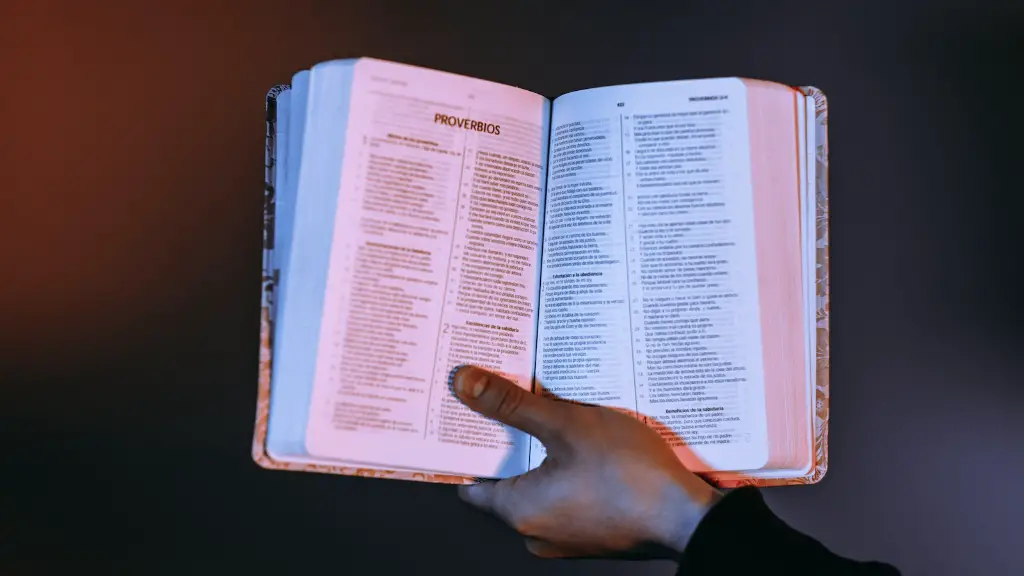Introduction
The Bible is the most revered religious text in the Christian faith, and it is seen as containing timeless spiritual wisdom. In recent years, the Bible’s teachings about LGBT people have become a controversial topic for many Christians, particularly in the U.S. and Europe. Some religious leaders have argued that the Bible explicitly supports their views that same-sex relationships and other LGBT lifestyles should be rejected and prohibited. Others have taken a more progressive stance, emphasizing Jesus’s love and acceptance of all people regardless of their sexuality. This article will examine what the Bible actually says about LGBT people and the various interpretations of this ancient text.
What Does the Bible Say About LGBT People?
The Bible mentions several passages that are often used to support a prohibition against same-sex relationships. One of the most widely cited is Leviticus 18:22, which reads “Thou shalt not lie with mankind, as with womankind: it is abomination.” Other passages that are frequently cited include Romans 1:26-27, Corinthians 6:9, and 1 Timothy 1:10. Opponents of LGBT rights often cite these passages as evidence that the Bible categorically prohibits same-sex relationships.
In addition to the passages that explicitly prohibit same-sex relations, the Bible also contains many references to the ideal relationship between a man and a woman. The most famous of these passages is Genesis 2:24, which states “Therefore shall a man leave his father and his mother, and shall cleave unto his wife: and they shall be one flesh.” This passage is often used to illustrate the traditional Christian view of marriage as between a man and woman.
Interpretations of the Bible
Although it’s clear that certain passages in the Bible are interpreted as being opposed to same-sex relationships and LGBT lifestyles, there is still considerable debate about the way these verses should be interpreted. For example, some theologians argue that the Leviticus 18:22 passage should be understood not as a condemnation of same-sex relationships, but rather a condemnation of same-sex intercourse within the context of temple prostitution. Others argue that the Genesis 2:24 passage should not be interpreted as codifying an ideal relationship between a man and woman, but rather as emphasizing the importance of a committed and faithful marital relationship, regardless of gender.
In fact, there is an increasing recognition within the Christian community of the need to reexamine traditional interpretations of the Bible. Some progressive theologians have argued that passages such as Leviticus 18:22 and Genesis 2:24 have been taken out of their original context and do not necessarily reflect the will of God. In particular, they have argued that while LGBT lifestyles may not have been explicitly condoned in the Bible, Jesus was a champion of acceptance and tolerance, and advocated for the love of all people, regardless of their identity.
LGBT People in the Church
In recent years, many Christian churches have become much more open and accepting of LGBT people. Most churches no longer adhere to a strict interpretation of the Bible that condemns same-sex relationships, and many congregations now include members of the LGBT community. This shift has been enabled in part by a new understanding of the Bible’s message, which encourages Churches to be more welcoming and open to all people, regardless of their sexual orientation.
The Debate Continues
The debate about the Bible’s teachings about LGBT people is unlikely to end soon. While many churches have become more progressive in their views, there is still a vocal minority that adheres to a more traditional interpretation of the Bible. With both sides of the debate citing scripture to support their positions, it is clear that biblical interpretation is an ongoing and complex process that differs from person to person.
Social Implications
The debate about LGBT rights has increasingly moved into the political sphere. In recent years, countries all over the world have been debating LGBT rights legislation, with both sides of the debate citing religious arguments to support their views. Consequently, the Bible has taken on a much more prominent role in this debate. For example, the U.S. Supreme Court’s landmark decision legalizing same-sex marriage in 2015 was largely informed by a reinterpretation of biblical passages that emphasized love and acceptance for all people.
On the other hand, some religious leaders have argued that the Bible’s prohibition against same-sex relationships should be enforced in law. They argue that the Bible’s teachings should reflect the will of God, and that LGBT rights legislation should be opposed on basis of religious principle.
Conclusion
The Bible’s teachings about LGBT people have been widely and hotly debated for centuries. While some Christians emphasize Jesus’s message of love and acceptance, others have taken a more traditional approach, citing scriptures that are seen as prohibiting same-sex relationships. Ultimately, the interpretation of the Bible is a personal matter, and each individual must come to their own conclusion about whether they believe the Bible supports or rejects LGBT lifestyles.

